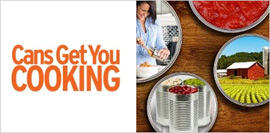food
Canned Foods Get Multi-Year Campaign
- by Karlene Lukovitz @KLmarketdaily, February 1, 2013
 The Can Manufacturers Institute (CMI) is launching a multi-year, multi-platform campaign to increase usage of canned foods.
The Can Manufacturers Institute (CMI) is launching a multi-year, multi-platform campaign to increase usage of canned foods.
Dubbed “Cans Get You Cooking,” the campaign kicks off Feb. 1, to coincide with National Canned Food Month.
CMI is the trade association of the metal and composite can manufacturing industry and its suppliers in the U.S. Investment in the campaign, which is funded by member companies Ball Corp., Crown Holdings, Inc. and Silgan Containers, will exceed $5 million in its first year, CMI VP of marketing and communications Sherrie Rosenblatt tells Marketing Daily.
The campaign is based on extensive research that confirmed strong, positive perceptions among existing canned food consumers, including confidence in these foods’ freshness and nutrients, according to Rosenblatt.
It aims to increase these consumers’ usage over time – not just get cans into the pantry, but out of the pantry and onto the table – by reinforcing the benefits of canned foods (including how the canning process seals in nutrition, freshness and taste) and encouraging and helping consumers to use them in creative, easy-to-prepare recipes and meals.
The campaign’s kickoff includes a partnership with “The Chew,” ABC’s daytime food talk show. During February, the show will feature weekly segments in which chefs “engage and educate” consumers about using canned foods in making recipes, according to Rosenblatt.
The effort will also have online, digital and social media presence through ABC’s media assets during February – plus a co-branded contest in which consumers who share their favorite canned food recipes can earn chances to attend a taping of “The Chew” in New York City.
In a recently launched campaign Facebook page (which already has about 5,300 “likes”), CMI and consumers are sharing recipes and tips and facts about canned food, cans and the canning process. The page will also cross-promote retailer-specific offerings and specific canned-food brands. (For instance, an image of Progresso artichoke hearts was used to prompt community members to discuss recipes or ways that they use the product.)
The campaign also has a new Pinterest presence, and plans to hold a Twitter party, offer videos on YouTube, and do outreach to influential mommy/food bloggers and dietitians, with focus on national and local canned-food promotions.
Other components include national and regional media materials, and a satellite media tour to support local retailer promotions.
Retailers will be supplied with customizable “Cans Get You Cooking” content, programming, and a toolkit for supermarket registered dietitians. They also have various options for tying into “The Chew” promotional partnership.
Packaged foods overall, including canned foods, began experiencing volume declines a decade ago, while fresh food volumes (e.g., raw fruits, raw vegetables, grains) have seen steady growth, according to The Hartman Group.
In July 2012, Nielsen reported that, between late September 2011 and mid-April 2012, 50 of 64 major food and non-alcoholic beverage categories had declining retail unit sales. Categories “bearing the brunt” of this trend included canned vegetables (units down 213 million), soup (units down 125 million) and frozen prepared foods (units down 86 million). Conversely, produce was among the 14 edible categories that saw unit gains. Nielsen noted that higher prices, less promotional support and high temperatures (which affected cold-weather categories such as soup) contributed to the packaged-goods volume declines during the period.
According to a report on the U.S. canned/preserved food packaging market published in July 2012 by CompaniesandMarkets.com, unit sales in this market declined slightly in 2011, to 15.8 billion units. Metal packaging’s share of total canned/preserved good packaging declined to 73%, in part reflecting product manufacturers’ expansion to other formats (unit sales of rigid plastic packaging increased by 3% in 2011).
The report notes that unit volume sales of U.S. canned/preserved food packaging are “likely” to continue to decline “as consumers turn to products perceived as fresher and healthier.”
Research from Key Note released in 2011 documented similar trends in canned food packaging in the U.K.


